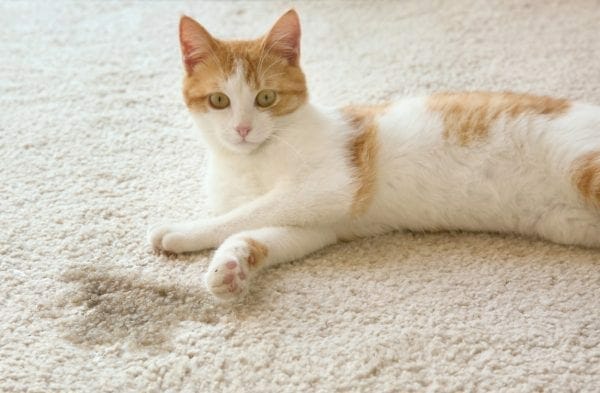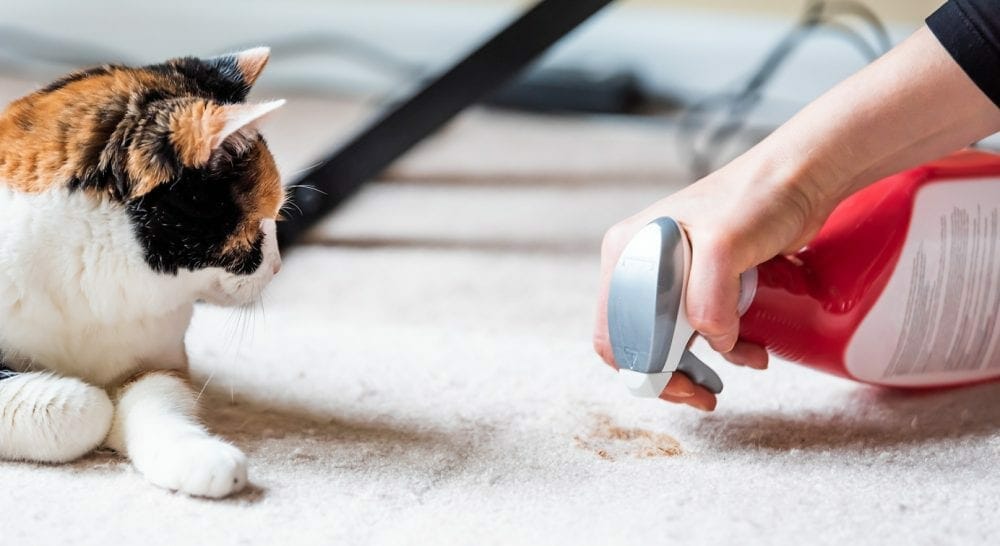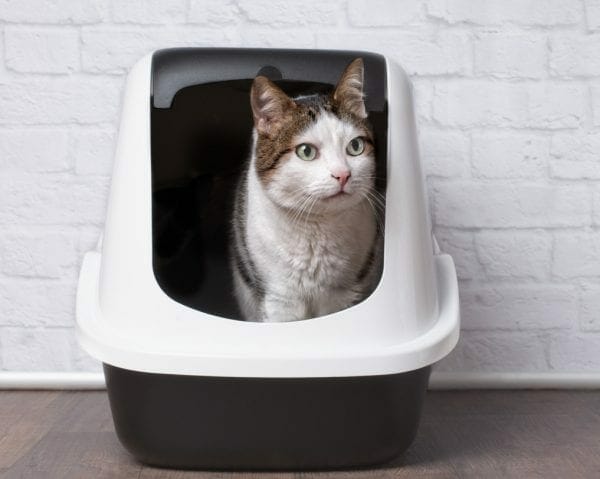How to Get Rid of Cat Urine Smell
If you have ever wondered, “Why does my cat spray?” you are not alone. Many cat owners may wonder why their cat, having been trained since kittenhood to use its litterbox, is now urinating on clothing, bedding, flooring, and walls. It can be an exhausting and frustrating task to constantly be cleaning after the cat’s random accidents all over the house.
Why Does My Cat Pee on the Floor, Mattress, or Clothes?
Some of the frequently seen reasons why cats abandon the litterbox for a clean sheet on the bed are:
- Anxiety. This could be due to not enough love being given to it or new changes made in its life.
- Health Issues. Urinary tract infections are the most common issue facilitating litterbox abandonment.
- Arthritis. As cats age, their ability to step into and out of a litterbox may become painful or difficult.

Why Do Cats Spray Urine?
Cats that are unfixed (not spayed or neutered) tend to spray urine vertically, much to the owner’s dismay. The constant need for some cats to spray their urine in whichever direction is usually based on one of the following reasons.
- Mating Issues. Hormonal changes tend to facilitate the spray of urine for cats that are unfixed. Males mark their terrain while females spray to attract mates. This is why fixing a cat stops the spraying. Male cats that are unneutered are more likely to leave their mark to attract a mate.
- Territory Issues. Cat spray is way for felines to mark their turf, especially in a house with multiple cats. In homes with several cats, spraying urine can be a way to mark territory, establish dominance, or settle disagreements.
- Changes or Stress. New life circumstances or a lack of love being felt by the cat may trigger nervousness or stress. This can cause them to spray out of exasperation with their living situation. Big or small changes can trigger cats to spray. Changes could be small (remodeling project) or big (a new house or the arrival of a new baby or cat).
If a cat is spraying or choosing other parts of the house as its litterbox, a visit to the vet may be needed for clarification of what the underlying issue may be. If a neutered cat begins spraying inside the house is usually an indicator that the cat is anxious, threatened, or stressed.
How to Get Cat Urine Smell Out of Carpets
 There are a variety of homemade and store-bought remedies for getting the reek of cat urine out of carpets. In spite of this, there are some tried and true steps to solving this ever-annoying dilemma for cat lovers.
There are a variety of homemade and store-bought remedies for getting the reek of cat urine out of carpets. In spite of this, there are some tried and true steps to solving this ever-annoying dilemma for cat lovers.
- The first step in knowing how to get rid of cat pee smells is by cleaning it up. As soon as an accident happens, the urine must be quickly soaked up as much as possible by a paper towel or rag.
- Learning how to neutralize cat urine is the second step. A practical substance like vinegar or hydrogen peroxide is frequently used. A highly-rated product that is the go-to for many a cat owner is Stink Free. It has the capacity to be used on multiple surfaces, removes odors of cat pee, and it is a natural, safe product.
- However, for a more potent product to neutralize powerful urine odors, many people turn toward enzymatic cleaners. Enzymes eat up the bacteria living in the cat’s urine, thereby removing all traces of the scent and the urine itself. A good enzyme cleaner is Smiling Paws Pets Stain and Odor Eliminator. This product contains no harsh chemicals, can be sprayed on nearly every type of surface, and fully eliminates all stains.
- Wet vacuums may be used to thoroughly clean the sullied area. Special care should be taken never to use steam cleaners on the area. The steam would only push the urine bacteria further into the carpeting.
Cat owners should ensure all remnants of the urine are gone from the carpet. If a cat can still detect traces of the pee, it will more than likely return and produce another accident.
Common Places Where Cats Spray
When a cat sprays for mating, territorial, or stress-related reasons, the spray is often vertical and may end up on places such as doors, windows, near cat flaps, curtains, electrical equipment, or garbage cans.
Cleaning cat spray effectively will depend on the surface that has been sprayed. If possible, it is important to keep the cat away from the sprayed area until the smell can be removed. Fabrics can be washed, but vertical surfaces (such as walls) may need to be cleaned with enzymatic cleaning solutions designed to remove the cat spray odor. It is critical that areas that have been marked with cat spray are cleaned as thoroughly as possible to prevent the cat from returning to the area to remark it.

Why Does Cat Urine Smell?
Cat urine, unlike the urine of other animals, has a distinctly unbearable scent. This is mostly due to the decomposition process of the urine. If a cat has an accident, the bacteria will begin to decay and give off a smell resembling ammonia. As the urine putrefies further, it will release an aroma similar to that of skunk spray. As one can imagine from this description, decaying cat urine can be a repulsive, bothersome issue to some cat owners.
Urinary Tract Issues in Cats

Undetected health issues often play a significant role in a cat’s abdication of the litterbox for the carpet. In particular, concerning cat health, urinary problems can be a pervasive issue for a majority cats.
Issues within the urinary tract often create an extremely painful experience for the cat when it tries to urinate. Because of this, the cat tends to perceive a correlation between its litterbox and burning discomfort.
The subsequent health conditions can make for a potentially painful bathroom experience:
- Hyperthyroidism
- Issues in the urinary tract
- Diabetes
- Kidney diseases
It is highly recommended that when a cat is continually and obstinately avoiding the litterbox, the vet should be visited for a check-up.
Treating Urinary Issues
In any case, cat owners are often directed by vets to make a habit of checking the cat’s urine and fecal matter, since these substances can be telling of its state of health.
If blood in cat urine is ever seen, it is vitally important that the cat be rushed to an animal hospital or vet’s office. Bloody urine may indicate that cat crystals have accumulated and blocked the urinary tract. This is a dire situation where the cat could be dead within 24 hours if it is not treated in time.
The cat urinary tract infection treatment and antibiotics that may be used to treat urinary issues is usually something along the lines of amoxicillin, cefovecin, or marbofloxacin. The most effective medicinal route for a cat, however, is left up to the expertise of a vet.
All treatment endeavors should be pre-approved by a board-certified vet before being administered to a cat.
The Relationship Between Bad Cat Behavior and Bullies
As loving and sweet as some cats can be, any cat may show an ugly side if it does not have an adequate space to relieve itself. If several cats are cohabiting one living area, this could make for a disastrous outcome. Many times when cats begin to spray indoors, they are indicating that they feel threatened, stressed, or territorial. Some of the issues can be solved by ensuring that each cat has their own litterbox located in a separate space.

Another issue is the size of a litterbox. Many cats prefer to have a spacious, private area to urinate. If a cat is given a litterbox that is too small or too dirty, it may choose to use bedding instead. Cleaning the litterbox on a daily basis is critical to prevent litterbox abandonment.
Because of the innate territorial nature of cats, cats need their own space and their own litterbox. If multiple cats reside in the same house, each one should be given its own litterbox away from all the others. This will keep the cats from attacking or bullying each other if they feel their space is being threatened.
It would be ideal for each cat to have a litterbox in its own room, corner, or closet for the purpose of doing its business unharmed.
Getting a full blood panel to test and rule out feline FIV and anemia, among other conditions will help determine the proper treatment for your beautiful feline.




